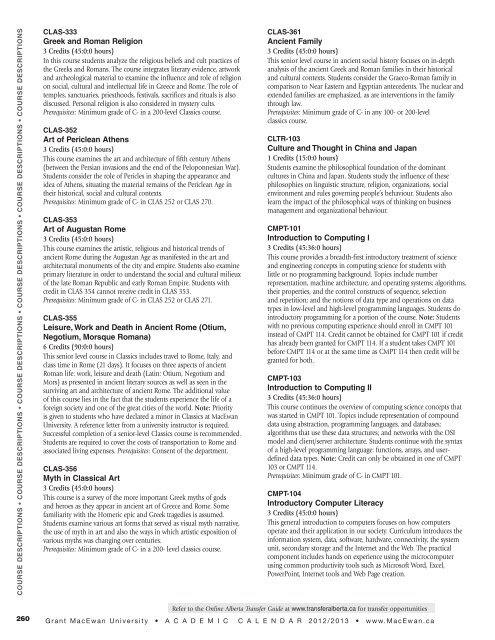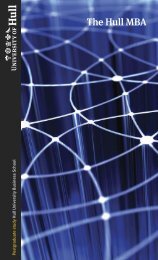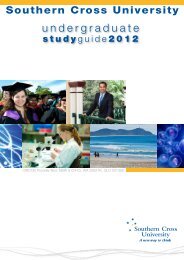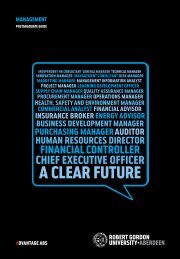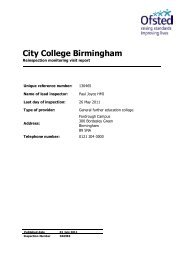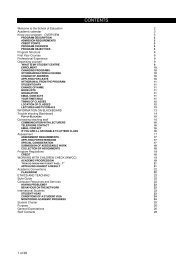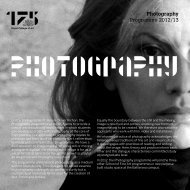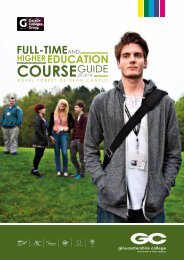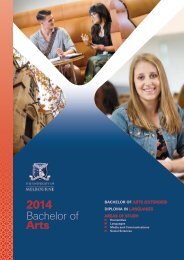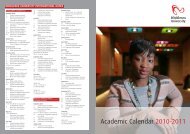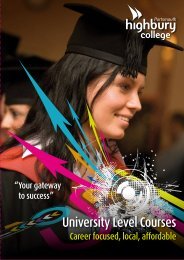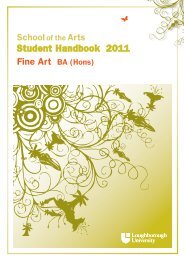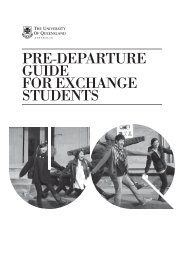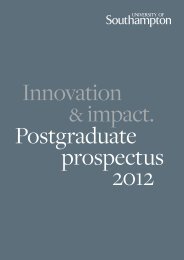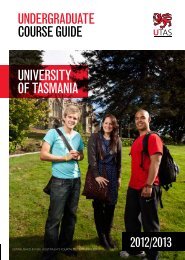Academic Calendar 2012/2013
Academic Calendar 2012/2013
Academic Calendar 2012/2013
You also want an ePaper? Increase the reach of your titles
YUMPU automatically turns print PDFs into web optimized ePapers that Google loves.
course Descriptions • course Descriptions • course Descriptions • course Descriptions • course Descriptions • course DescriptionsCLAS-333Greek and Roman Religion3 Credits (45:0:0 hours)In this course students analyze the religious beliefs and cult practices ofthe Greeks and Romans. The course integrates literary evidence, artworkand archeological material to examine the influence and role of religionon social, cultural and intellectual life in Greece and Rome. The role oftemples, sanctuaries, priesthoods, festivals, sacrifices and rituals is alsodiscussed. Personal religion is also considered in mystery cults.Prerequisites: Minimum grade of C- in a 200-level Classics course.CLAS-352Art of Periclean Athens3 Credits (45:0:0 hours)This course examines the art and architecture of fifth century Athens(between the Persian invasions and the end of the Peloponnesian War).Students consider the role of Pericles in shaping the appearance andidea of Athens, situating the material remains of the Periclean Age intheir historical, social and cultural contexts.Prerequisites: Minimum grade of C- in CLAS 252 or CLAS 270.CLAS-353Art of Augustan Rome3 Credits (45:0:0 hours)This course examines the artistic, religious and historical trends ofancient Rome during the Augustan Age as manifested in the art andarchitectural monuments of the city and empire. Students also examineprimary literature in order to understand the social and cultural milieuxof the late Roman Republic and early Roman Empire. Students withcredit in CLAS 354 cannot receive credit in CLAS 353.Prerequisites: Minimum grade of C- in CLAS 252 or CLAS 271.CLAS-355Leisure, Work and Death in Ancient Rome (Otium,Negotium, Morsque Romana)6 Credits (90:0:0 hours)This senior level course in Classics includes travel to Rome, Italy, andclass time in Rome (21 days). It focuses on three aspects of ancientRoman life: work, leisure and death (Latin: Otium, Negotium andMors) as presented in ancient literary sources as well as seen in thesurviving art and architecture of ancient Rome. The additional valueof this course lies in the fact that the students experience the life of aforeign society and one of the great cities of the world. Note: Priorityis given to students who have declared a minor in Classics at MacEwanUniversity. A reference letter from a university instructor is required.Successful completion of a senior-level Classics course is recommended.Students are required to cover the costs of transportation to Rome andassociated living expenses. Prerequisites: Consent of the department.CLAS-356Myth in Classical Art3 Credits (45:0:0 hours)This course is a survey of the more important Greek myths of godsand heroes as they appear in ancient art of Greece and Rome. Somefamiliarity with the Homeric epic and Greek tragedies is assumed.Students examine various art forms that served as visual myth narrative,the use of myth in art and also the ways in which artistic exposition ofvarious myths was changing over centuries.Prerequisites: Minimum grade of C- in a 200- level classics course.CLAS-361Ancient Family3 Credits (45:0:0 hours)This senior level course in ancient social history focuses on in-depthanalysis of the ancient Greek and Roman families in their historicaland cultural contexts. Students consider the Graeco-Roman family incomparison to Near Eastern and Egyptian antecedents. The nuclear andextended families are emphasized, as are interventions in the familythrough law.Prerequisites: Minimum grade of C- in any 100- or 200-levelclassics course.CLTR-103Culture and Thought in China and Japan1 Credits (15:0:0 hours)Students examine the philosophical foundation of the dominantcultures in China and Japan. Students study the influence of thesephilosophies on linguistic structure, religion, organizations, socialenvironment and rules governing people’s behaviour. Students alsolearn the impact of the philosophical ways of thinking on businessmanagement and organizational behaviour.CMPT-101Introduction to Computing I3 Credits (45:36:0 hours)This course provides a breadth-first introductory treatment of scienceand engineering concepts in computing science for students withlittle or no programming background. Topics include numberrepresentation, machine architecture, and operating systems; algorithms,their properties, and the control constructs of sequence, selectionand repetition; and the notions of data type and operations on datatypes in low-level and high-level programming languages. Students dointroductory programming for a portion of the course. Note: Studentswith no previous computing experience should enroll in CMPT 101instead of CMPT 114. Credit cannot be obtained for CMPT 101 if credithas already been granted for CMPT 114. If a student takes CMPT 101before CMPT 114 or at the same time as CMPT 114 then credit will begranted for both.CMPT-103Introduction to Computing II3 Credits (45:36:0 hours)This course continues the overview of computing science concepts thatwas started in CMPT 101. Topics include representation of compounddata using abstraction, programming languages, and databases;algorithms that use these data structures; and networks with the OSImodel and client/server architecture. Students continue with the syntaxof a high-level programming language: functions, arrays, and userdefineddata types. Note: Credit can only be obtained in one of CMPT103 or CMPT 114.Prerequisites: Minimum grade of C- in CMPT 101.CMPT-104Introductory Computer Literacy3 Credits (45:0:0 hours)This general introduction to computers focuses on how computersoperate and their application in our society. Curriculum introduces theinformation system, data, software, hardware, connectivity, the systemunit, secondary storage and the Internet and the Web. The practicalcomponent includes hands on experience using the microcomputerusing common productivity tools such as Microsoft Word, Excel,PowerPoint, Internet tools and Web Page creation.260Grant MacEwan University • A C A D E m I CRefer to the Online Alberta Transfer Guide at www.transferalberta.ca for transfer opportunitiesC A L E N D A R <strong>2012</strong>/<strong>2013</strong> • www.MacEwan.ca


